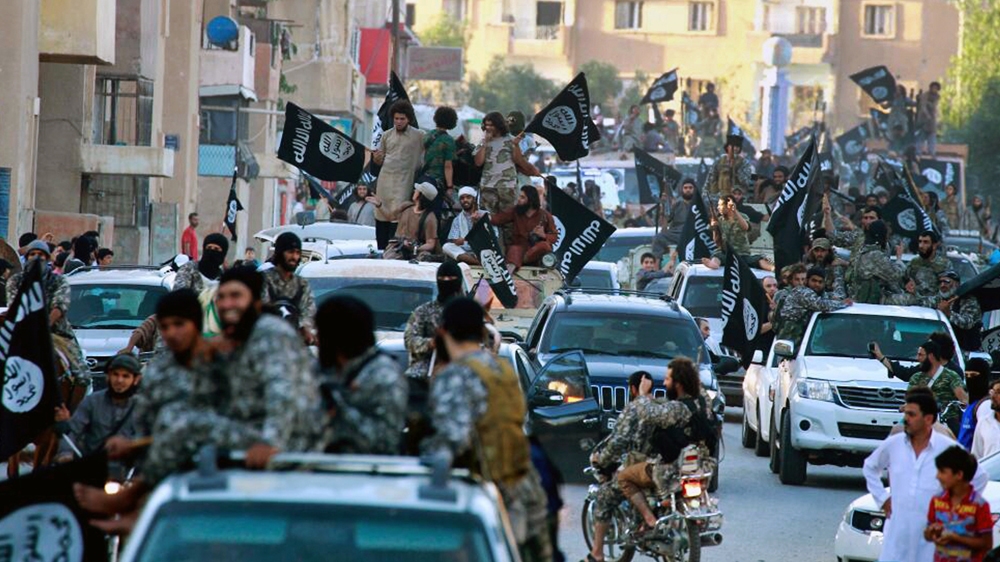A resident of the city reflects on daily life under ISIL.
Ghareb al-Omawi is a name I made up and use on my social media accounts, such as Facebook, after the eastern region of Syria, from Raqqa to Deir az Zor, fell under ISIL’s control. Ever since, our life has changed forever.
Daily life in Raqqa has become more like a large prison guarded by masked men in black. We often wake up in the morning to the sounds of warplanes roaming the skies.
The drones almost never leave the city’s skyline. They are accompanied by warning sirens that ISIL has set up in the city.
Now the children of Raqqa are no longer scared of bombings. They are even able to distinguish the type of warplane hovering above us, and whether it belongs to the regime, the Russian army, or the US-led coalition.
Women no longer scream as they used to when they first heard the sound of the warplanes.
We can now tell who the newcomers are in our city, when we see the panic, fear and anxiety on their faces as they hear the sound of warplanes.
Every day I leave my home and roam in and around the streets of Raqqa. With mixed feelings of fear, nervousness and disgust, I try to document atrocities committed by ISIL in the city.
I started documenting ISIL crimes after they arrested one of my close friends and later killed him on charges of spying for the Free Syrian Army (FSA).
I began publishing news about the daily events that occurred in areas under ISIL control. I also covered many violations, such as arrests, crucifixions and stonings.
Before the war, or the revolution, as I prefer to call it, against the dictatorship of the Bashar al-Assad regime, I was studying agricultural engineering at the Euphrates University.
I used to spend my time like the rest of the Syrian youth; I had hobbies like football and swimming, and enjoyed going on dates.
When the revolution broke out in March 2011, I started taking part in the peaceful protests in Deir az Zor in eastern Syria.
The peaceful protests lasted for about three months, and the number of demonstrators eventually reached 500,000 in the city’s main square.
The regime forces began to crack down on protesters, targeting many youths. Raqqa residents responded with civil disobedience, setting up barriers and disrupting transportation routes in the city.
This prompted government forces to deploy tanks, heavy machinery and a large number of ground troops.
In the meantime, my family and I fled to Raqqa, which was better off than Deir az Zor. We fled because we were afraid of the brutal shelling and the massive crackdown by the Syrian government.
I tried to go back to university, but I received a letter from one of my friends that shocked me and basically ruined my future. The letter said: “A dismissal order from the university has been issued against you for political reasons.”
He did not provide me with more information regarding the dismissal order, and with this decision, I was denied the right to continue my studies. Until this day, I dream of going back to university.
In March 2013, the FSA liberated Raqqa from government forces with the help of fighters from al-Nusra Front, an alliance that later collapsed. Events escalated very fast, and by early 2014, ISIL controlled the city of Raqqa after fierce battles with FSA fighters, who later withdrew.
ISIL began to raise their black flags over their headquarters. They carried out many arrests, began to steal from governmental organisations, and brought down everything related to the Syrian national identity in preparation to build their own “Islamic State”.
ISIL built their so-called state by using methods similar to those employed by the Syrian government, including arrests and killings.
However, the brutality of ISIL’s crimes surpassed the regime’s, as they began crucifying, cutting off hands, stoning and publicly flogging people.
ISIL has enforced strict rules against smoking cigarettes. Anyone arrested for smoking is immediately flogged in public with up to 40 lashes for the first offence, and flogged and put in jail for the second offence.
If they get caught a third time, they are flogged, fined, put in jail and exiled from the city.
Recently, arrest campaigns have increased, mostly targeting youth for behaviours such as smoking, wearing tight pants or shaving their beards. For women, the main charge is violating the Islamic traditional dress.
Having watched the situation deteriorate, I decided with a group of experienced activists and journalists to launch a project called Sound and Picture, which documents human rights violations committed by all the armed factions in the Syrian war.
This project, which gives a voice to the people who live in ISIL-held areas, has two sections: a media section and a documenting section.
I work in the media section, and our task is to either secretly receive or personally capture footage of whatever violation is taking place or about to take place. We then instantly post it on our pages. What we do is dangerous.
I cannot speak about the process we go through to receive or capture such information, as it could get us into serious trouble.
The violations committed by ISIL are beyond cruel, and some people have completely ignored this fact. No one cares about all those getting detained in Raqqa; no one asks about those innocent civilians taken by ISIL.
When we focus on our work with the determination of exposing all ISIL violations, the feeling of fear goes away.
We have hope that one day our work will set us free and bring ISIL to justice. That is what we want to show to the world. Al Jazeera






 WhatsApp us
WhatsApp us 

